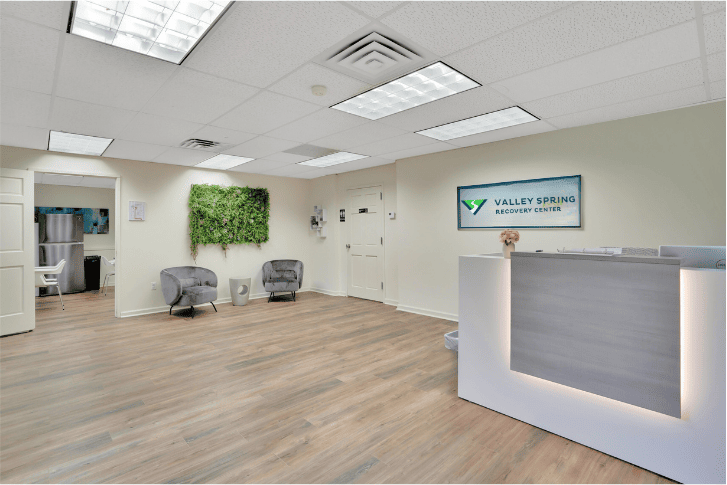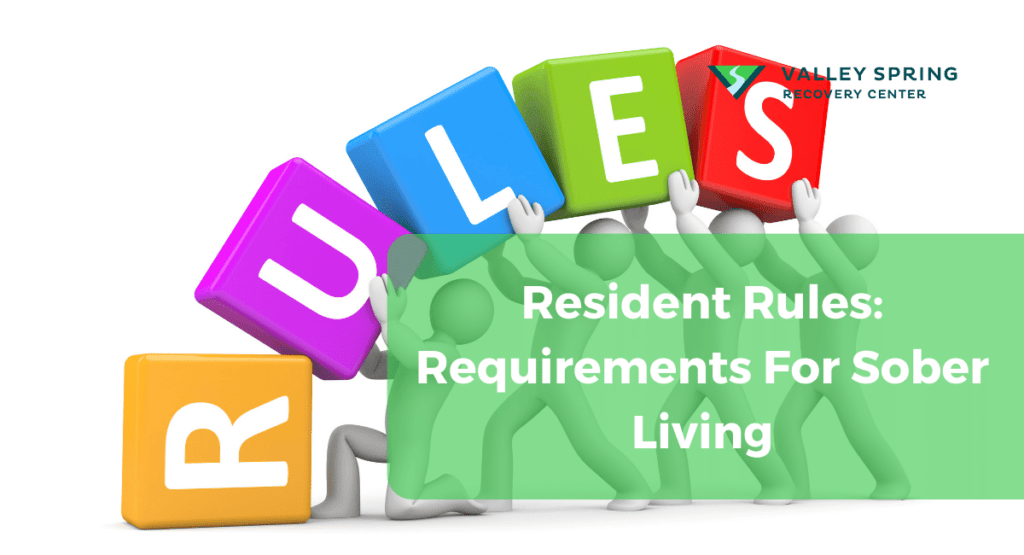Medication-Assisted Therapy at Valley Spring Recovery Center
Medication-assisted Treatment or MAT for short, is a type of therapeutic intervention that occurs within Partial Hospitalization Programs and outpatient treatment. MAT assists in the initial phases of recovery by curbing cravings and managing physical withdrawal symptoms.
Medication Assisted Treatment, is an evidence-based therapy which means that it has been thoroughly tested under randomized studies or controlled trials facilitated by medical and clinical professionals, and has been proven to yield effective outcomes. These research-based treatments that are tailored to meet people’s needs, preferences, and cultural expectations. MAT has been well researched and found to be a pivotal tool for many in their recovery journey.
What Are The Key Benefits of MAT?
The Substance Abuse and Mental Health Services Administration (SAMHSA) has endorsed MAT for its clinical efficacy in aiding individuals to achieve and sustain recovery. MAT’s holistic approach, combining medication with behavioral therapy, often proves to be the linchpin for long-term recovery.
MAT has demonstrated its ability to:
- Enhance patient longevity
- Boost retention in treatment programs
- Reduce illicit drug use and associated criminal activities
- Facilitate employment opportunities for clients
- Improve birth outcomes for pregnant women with substance use disorders
- Minimize the risk of HIV or hepatitis C transmission by curtailing relapse chances
How Does Medication Assisted Treatment Work At Valley Spring Recovery Center?
Valley Spring Recovery Center, understands that the path to recovery from substance use disorders can be challenging and multi-faceted which requires a comprehensive approach to treatment including psychotherapy and medication assistance. Our MAT program combines counseling and behavioral therapies with FDA-approved medications, to address mental and physical aspects of recovery from substance use disorder.
We use a variety of medications depending on the specific substance use disorder being treated. For opioid use disorders, we may employ medications such as Buprenorphine, and Naltrexone. For alcohol use disorders, we may use medications such as Naltrexone, Acamprosate, and Disulfiram. These medications are administered under the close supervision of our medical team to ensure the safety and effectiveness of the treatment.
What Medications Are Prescribed To Treat Addiction?
The FDA-approved medications, prescribed by our knowledgeable medical team led by Dr Michael Olla are listed below.
- Suboxone (Buprenorphine): Unlike Methadone, Suboxone is a partial agonist. Comprising Buprenorphine and Naloxone, it effectively treats opioid withdrawal by alleviating symptoms and curbing cravings. If opioids are abused while on Suboxone, adverse reactions occur due to Naloxone’s counteractive properties.
- VIVITROL®: An FDA-approved injectable antagonist, VIVITROL® curbs cravings for extended periods. Administered monthly, it alleviates withdrawal symptoms, prevents overdoses, and requires a 14-day opiate abstinence before the first dose.
- Sublocade: A monthly Buprenorphine injection, Sublocade activates brain receptors in a controlled manner, eliminating euphoric sensations and cravings. As part of a comprehensive treatment plan, Sublocade aids adults in achieving lasting recovery.
- Subutex (Buprenorphine): Similar to Suboxone, Subutex’s primary ingredient is Buprenorphine. The primary distinction lies in the absence of Naloxone in Subutex, making it a preferred treatment option for those intolerant to Suboxone.
- Naltrexone (Oral and Injectable) is an opioid antagonist that plays a pivotal role in reducing the craving for alcohol. It achieves this by blocking the euphoric effects and feelings of intoxication that alcohol typically induces. Naltrexone is available in two forms: oral (brands include ReVia and Depade) and as an extended-release injectable form known as VIVITROL®. A key aspect of Naltrexone’s mechanism is its ability to target the brain’s reward system, effectively diminishing the pleasure derived from alcohol consumption.
- Acamprosate, commonly known as Campral, is an amino acid modulator that aids individuals with AUD by restoring the balance of neurotransmitters in the brain. This balance is often disrupted by chronic alcohol consumption. Acamprosate is administered orally in tablet form. It has proven especially effective for those who have already ceased drinking and are striving to maintain their abstinence.
- Disulfiram, or Antabuse, operates as an enzyme inhibitor. Its primary function is to produce a series of unpleasant side effects, such as flushing, nausea, and palpitations, when even minor amounts of alcohol are ingested. Available in tablet form, Disulfiram acts as a strong deterrent, discouraging individuals from consuming alcohol due to the adverse reactions it triggers.
- Topiramate, often recognized by its brand name Topamax, is an anticonvulsant. While it isn’t FDA-approved specifically for AUD, it has demonstrated potential in both reducing alcohol consumption and promoting abstinence. Administered orally, Topiramate influences neurotransmitter activity in the brain, thereby reducing the pleasurable sensations associated with alcohol.
- Baclofen is primarily known as a muscle relaxant and antispasmodic agent. However, it has found off-label use in treating AUD, where it can diminish cravings and alcohol consumption in certain individuals. Baclofen’s mode of action revolves around its impact on the GABA receptors in the brain, which can potentially reduce the desire for alcohol.
Who is a Fit for Medication-Assisted Treatment at Valley Spring Recovery Center?
Valley Spring Recovery Center, a premier Partial Hospitalization Program (PHP) and outpatient addiction treatment facility located in Norwood, NJ, serves the communities of Bergen County, NJ, and Rockland County, NY. Specializing in comprehensive recovery solutions, the center offers Medication-Assisted Treatment (MAT) as a pivotal component of its addiction treatment services. Understanding who is a fit for MAT is crucial for individuals seeking effective recovery pathways.
Ideal Candidates for MAT at Valley Spring Recovery Center
- Individuals with Opioid Use Disorder: MAT is highly effective for those battling opioid addiction, including prescription pain relievers, heroin, and fentanyl. It helps reduce withdrawal symptoms and cravings, making recovery more manageable.
- Patients Seeking a Comprehensive Recovery Plan: Those who understand the importance of a multifaceted approach to recovery, including the combination of medication, counseling, and behavioral therapies, will find MAT especially beneficial.
- Individuals Committed to Long-Term Recovery: MAT is most effective for individuals dedicated to a long-term recovery plan. It requires adherence to the treatment protocol and active participation in counseling and therapy sessions.
- Patients with a History of Relapse: For individuals who have experienced relapse in the past, MAT provides a stabilizing influence, reducing the likelihood of future relapses by managing cravings and withdrawal symptoms.
- Residents of Bergen County, NJ, and Rockland County, NY: As a local provider, Valley Spring Recovery Center is ideally positioned to serve residents of these communities, offering accessible, high-quality care tailored to the unique needs of the local population.
Our Approach To MAT for Substance Use Disorder
Our medical professionals at Valley Spring Recovery Center employ MAT for alcohol and opioid use disorders. Medications used can help to normalize brain chemistry, block the euphoric effects of substances, relieve withdrawal symptoms, and reduce cravings. This evidence-based approach can help improve patient survival, increase retention in treatment, decrease relapse rates.
Integrated Care
At Valley Spring Recovery Center, we believe that medication is just one part of a comprehensive recovery plan. Thus, our MAT program is always integrated with other forms of therapy such as individual counseling, group therapy, and cognitive-behavioral therapy. This allows us to address not only the physical aspects of addiction but also the psychological and social factors that contribute to substance use disorders.
Safety and Monitoring
Patient safety is our top priority. Our team closely monitors the administration of all medications and adjusts treatment plans as necessary based on each patient’s progress and needs. Regular check-ins ensure that medications are helping to reduce cravings and withdrawal symptoms without causing undue side effects.
Commitment to Recovery
We are committed to helping each individual find their path to recovery. Our medication-assisted therapy is an effective component of this commitment, but it is not a standalone solution. It is part of a broader, patient-focused approach that includes a commitment to long-term aftercare and relapse prevention.
Creating an SEO-optimized article snippet for Valley Spring Recovery Center, focusing on medication-assisted treatment (MAT) and its suitability for patients, requires careful attention to contextual vectors, hierarchy, structure, connection, and flow. Here’s how you might structure such content:
Get Started With Medication Assisted Treatment In Northern New Jersey Today!
At Valley Spring Recovery Center in New Jersey, we believe that everyone has the potential to recover and live a fulfilling life. If you or a loved one is struggling with a substance use disorder, please reach out to us to learn more about our medication-assisted therapy and other treatment options. We provide MAT at all levels of care including Partial Care, IOP and OP and remain committed to help our patients and their families every step of the way on the journey to recovery.
We understand that overcoming addiction is not a solitary journey, but a path that often requires professional guidance and evidence-based treatments. Our Medication-Assisted Therapy is one such offering, designed to facilitate the recovery process while minimizing withdrawal symptoms and reducing cravings. If you or a loved one is struggling with substance use disorder, don’t wait. Reach out to our experienced team today. Let us help you take that crucial first step towards healing, health, and hope. Begin your recovery journey with Valley Spring Recovery Center, and let us show you the transformative power of Medication-Assisted Therapy. Call us today or fill out the form on our contact page to get started on your path to recovery.




